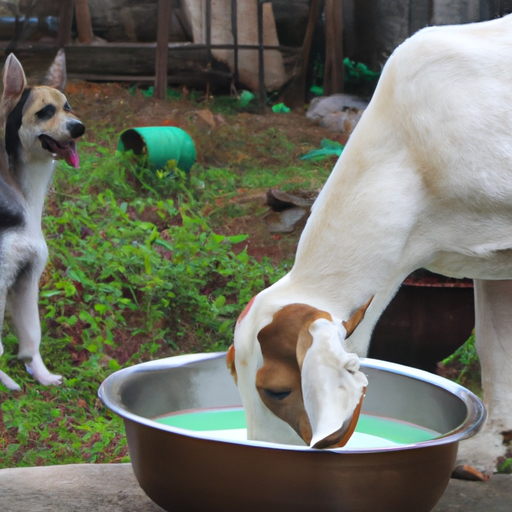Introduction: The Rising Trend of Goat’s Milk for Dogs
You might be wondering, “Goat’s milk for dogs? Really?” Yes, you heard it right. Goat’s milk has become a popular dietary supplement among pet parents and caregivers. It’s not a mere trend, but a health-inducing practice backed by a wealth of benefits. Before you raise your eyebrows, let’s dive into the world of goat’s milk and its impact on our four-legged buddies.
Unveiling the Nutritional Profile of Goat’s Milk
Goat’s milk is a complete food. It’s packed with essential nutrients, vitamins, and minerals your dog needs. Here’s a table of what to expect:
| Nutrients | Benefits for Dogs |
|---|---|
| Proteins | Aid in tissue repair and growth, boost immunity |
| Fats | Provide energy, keep skin and coat healthy |
| Vitamins A, B, C, D, E, K | Bolster eye health, improve digestion, boost immunity, promote bone health |
| Minerals (Calcium, Potassium, Magnesium) | Strengthen bones, regulate fluid balance, support heart health |
The Top Five Benefits of Goat’s Milk for Dogs
- Digestive Health Booster: Goat’s milk is rich in probiotics. These beneficial bacteria promote a healthy gut, aid digestion, and can help alleviate issues like diarrhea or constipation.
- Immunity Enhancer: The abundance of vitamins and minerals in goat’s milk work in synergy to strengthen your dog’s immune system.
- Skin and Coat Nourisher: The fats and proteins in goat’s milk do wonders for your dog’s skin and coat, making them healthier and shinier.
- Bone Strengthener: Goat’s milk is a fantastic source of calcium, which is vital for bone health and growth, particularly in puppies.
- Hydration Promoter: Its high moisture content makes it an excellent hydrator, especially during hot weather or for dogs who don’t drink enough water.
The Safe Way to Introduce Goat’s Milk to Your Dog’s Diet
Introducing a new supplement into your dog’s diet should always be done gradually. Start with small amounts mixed into their regular food and watch for any adverse reactions. If your dog seems to enjoy and digest the milk well, you can slowly increase the quantity.
Remember, goat’s milk should complement your dog’s diet, not replace meals. Consult your vet to determine the right amount for your pup based on their size, age, and health status.
Common Misconceptions About Goat’s Milk for Dogs
Despite its benefits, goat’s milk has been the subject of a few misconceptions. Here are a couple of myths debunked:
- Myth: Goat’s milk causes lactose intolerance in dogs.
-
Fact: While some dogs may be lactose intolerant, goat’s milk has less lactose than cow’s milk and is generally easier to digest.
-
Myth: Goat’s milk is just a fad with no real benefits.
- Fact: Goat’s milk has been used for centuries for its nutritional benefits. It’s a natural, nutrient-packed supplement that can greatly benefit your dog’s overall health.
FAQ
Q1: Can all dogs have goat’s milk?
Most dogs can safely consume goat’s milk. However, if your dog has a specific health condition, consult your vet.
Q2: Can puppies have goat’s milk?
Yes, goat’s milk is excellent for puppies, especially for its calcium content.
Q3: How much goat’s milk should I give my dog?
The quantity can vary. Start with small amounts and consult your vet for a precise recommendation.
Q4: Can goat’s milk replace water for my dog?
No, water is essential and cannot be replaced by any other drink.
Q5: Is raw goat’s milk or pasteurized better for dogs?
Both have benefits. Raw milk has more active probiotics, but pasteurized milk is safer. Consult your vet to choose the best option.
So, there you have it – the scoop on goat’s milk for dogs. As a caregiver, you’re always looking for the best for your furry friends. Goat’s milk, with its nutritional prowess, might just be the next best addition to your dog’s diet.



